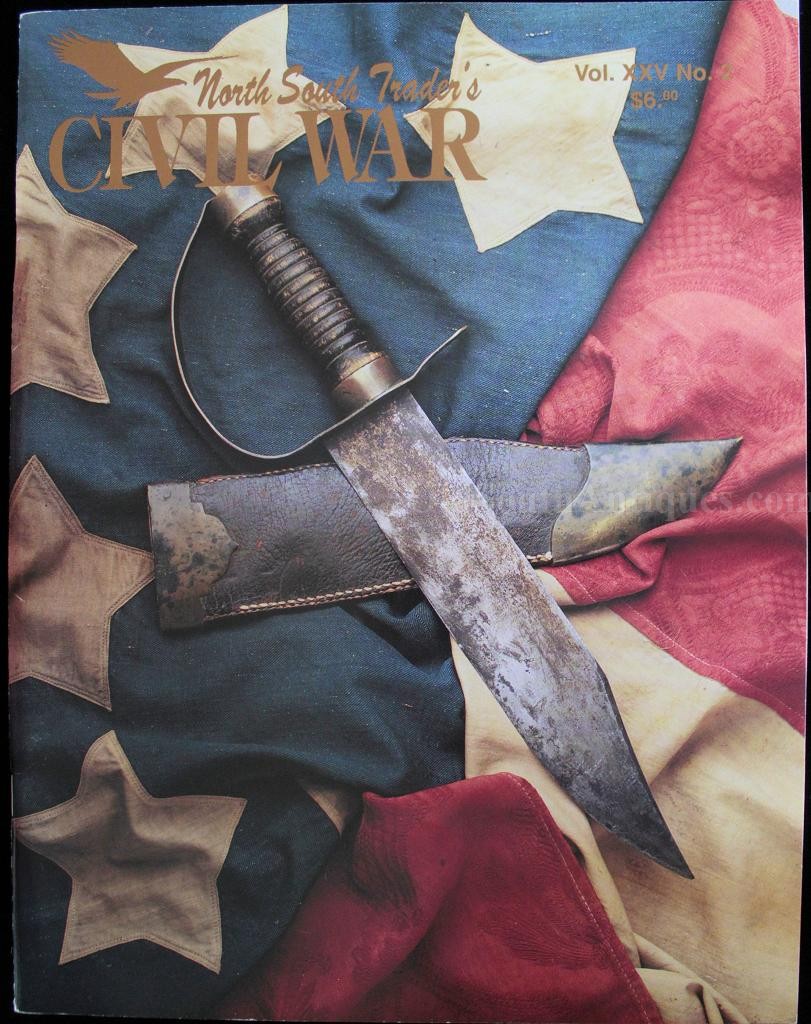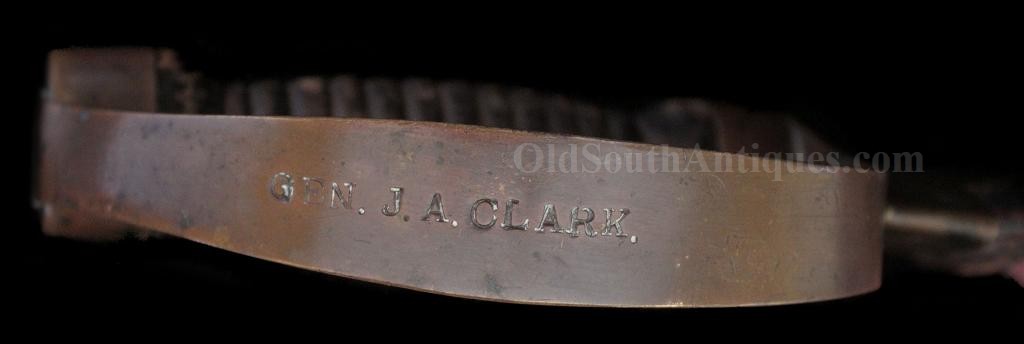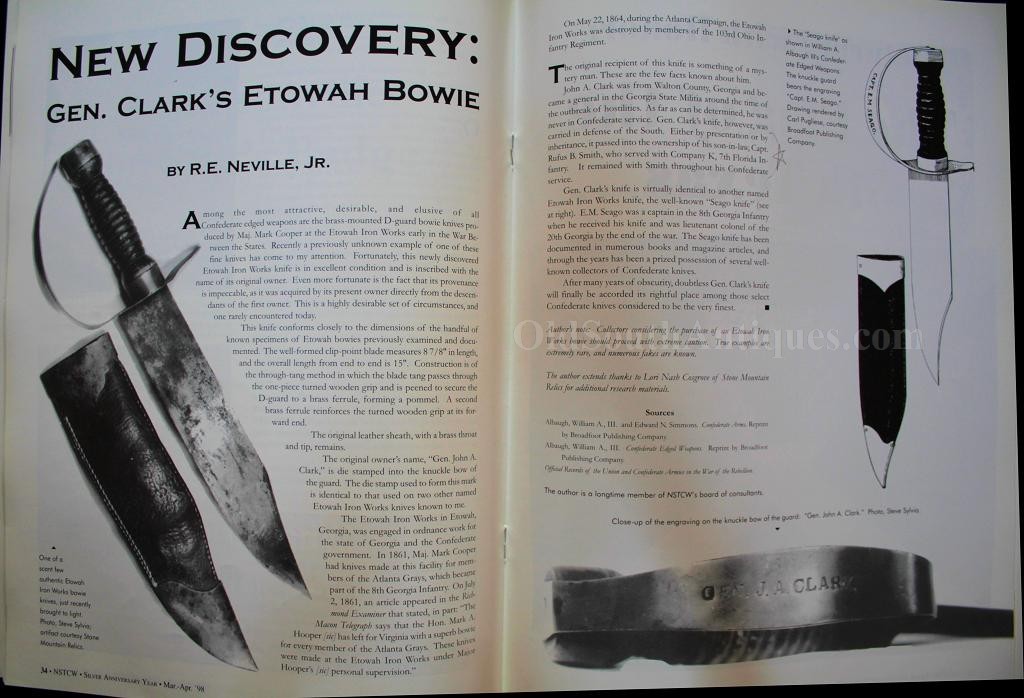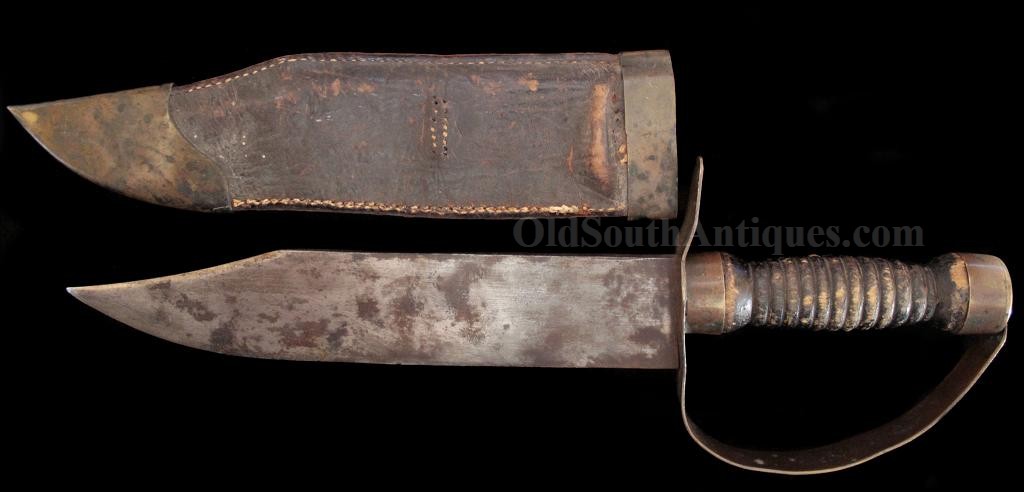
| Catalog | Past Items | Order Info | Terms/Conditions | About Us | Inventory Clearance |
Major General Josiah A. Clark was born January 12th, 1814 in South Carolina. As a young man he was living in Warren County, Georgia. He owned a railroad stop restaurant near Social Circle, Georgia and another near Stone Mountain. In 1860 he was captain of the Walton Cavalry, 42nd Regiment Georgia Militia, and had been for nearly two decades. War has its demands, and in 1861 his decades of militia service led him to be appointed a Major General in the State of Georgia. As the War progressed, even though he was forty-nine years old, he joined the 10th Georgia Cavalry as a private in 1863, and served the remainder of the War in that capacity. He died in 1872 and lies in the Social Circle City Cemetery.
The knife had been presented to General Clark by Major Mark Cooper, who owned the Etowah Iron Works, and he in turn presented it to his son in law Rufus B. Smith, Captain of Company K, 7thFlorida Infantry. It is not known if he presented it to Captain Smith during or after the War, but one of them carried it a great deal.
The Etowah Iron Works Bowie is perhaps the most finely finished, beautiful, historically storied, admired and desired, of all Confederate knives. Only eight are known to exist, with nearly half of those in museums where they will never again be on the collector’s market. Though only a few remain in private hands, occasionally one comes onto the collector’s market, and when it does it commands a premium; but, as with buying art work, furniture, rare coins etc. buying the very best one can afford is always the wisest investment and the most enjoyable to own.
The Cooper, or Etowah (as it is sometimes called) Iron Works was founded by a remarkable man by the name of Mark Anthony Cooper. Had the War not come along, he likely would be as familiar to the public as Samuel Colt, but providence decided otherwise. Mark Cooper was born in Hancock County, Georgia in 1800. By the age of 32 he had attended two colleges, opened his own law firm, had married twice due to the death of his first wife, was solicitor general of the Ocmulgee Circuit Court, was a Major in the Georgia Militia, secured a charter for a railroad from Augusta to Eatonton and was elected to congress. As I said earlier, he had done all this by the age of 32. A remarkable man he was indeed. His creed was God, family and friends, before state and business.
Not a man to slow down, in the following ten years he erects one of the earliest cotton mills in Georgia, commands five companies of Georgia Militia, opens and runs a very successful bank, is elected to the 26th Congress, loses the election for the 27th Congress and is reelected to the 28thCongress, but resigns to run for Governor of Georgia; a bid he loses, and acquires 12,000 acres in Cartersville, Georgia along the Etowah River. Here he retires from political life and settles down with his family.
"Settled” for such a man is impossible; his acreage contained a high concentration of iron ore, was close to the railroad and had water for power and transportation. These things are impossible for an entrepreneur to ignore. In a few years he establishes the Etowah Iron & Manufacturing Company, better known to history as the Etowah Iron Works. The Iron Works were close to the railroad, but still a few miles away, so naturally, Cooper founds a railroad. It was he who financed and oversaw the construction of Tunnel Hill, a remarkable engineering feat for its time. So only eight years after Cooper "settled down” with his family he had one of the largest forges of its day and built and owned singly the rail line connecting to the Western and Atlantic Railroad, opening rail service to Atlanta and Chattanooga.
Though he could see the vast opportunity just over the horizon, these ventures left Cooper in debt. Though his assets far exceeded his debt, his cash flow could not keep up with demand and the Etowah Iron Works had to be sold at auction to pay his creditors. Thirty-eight men of standing, who were his friends and could see his vision, loaned him the funds to buy back the Iron Works for twice the debt he owed. It paid off and his friends were paid off early. An excellent example of Cooper’s character stands in the Cartersville town square. It is known as the Friendship Monument, which Cooper erected and listed the names of those Thirty-eight men, in appreciation of their help. No other such monument is known to exist in the world.
Mark Cooper had long been a States Rights proponent and Officer in the State Militia. Obviously a visionary, he could see that war was virtually inevitable. He began a correspondence with Sam Colt and Eli Whitney, Jr. for the purpose of purchasing arms to Georgia. In the fall of 1860 Cooper writes advising the Governor: "resolve on secession” and in December he requests a contract to make arms for Georgia as "they would be needed very soon”. He also writes to the Confederate secretary of war advising him to arm all of the Southern States. Mark Cooper could clearly see what most could not even fathom. Cooper’s plans extended beyond smelting iron, he had intention of producing firearms for Georgia. Cooper was sent to the North to meet with Samuel Colt to arrange to purchase $75,000.00 worth of arms and to study Colt’s Manufactory with an eye to establishing his own arms manufactory. Then came war. Cooper’s eldest son Thomas, a prominent man in his own right, was elected Captain of the Atlanta grays. John, Cooper’s second son, who was practicing law in Rome, Georgia at the time helped to recruit cavalrymen from Floyd County, for Forrest and Cooper’s third son, Mark, served as a private in the Floyd Infantry. On May 23rdthe Atlanta Grays were presented with a flag during a fitting ceremony filled with speeches of gratitude, honour, sacrifice and duty. Mark Cooper also presented the Officer’s with Bibles and the finest D-Guard knives produced in the South. It is believed that he eventually made knives for all of the Atlanta Greys and the Floyd infantry which would be about two hundred, though only eight* are known to exist today. This would be a remarkably low survival rate for such a fine knife if he did in reality make two hundred knives. As I stated earlier, Mark Cooper was a strong States Rights man, and so were his sons. Though he naturally had a father’s fear of sending his sons to war, and he had such influence he could easily have had them excused, there was no doubt as to their duty and men of such stock could not shirk that duty. Heartbreak was not long in coming. John was mortally wounded July 21, 1861 at Manassas. Thomas was killed on Christmas Eve in an accident. It had been only seven months since Mark Cooper watched his sons march away and two were already dead. Cooper took a month to reflect and then wrote Jefferson Davis "I had three sons, they all volunteered to serve the country and formed a part of the 8th Regt. Ga. Volunteers. The events of the campaign of the Potomac have taken two, on whom my hopes mainly rested.” (These two had been prominent businessmen and entered service as officer’s, the surviving son entered as a private) Cooper was now 61 years old and needed his son’s help and no doubt needed to save him from his brother’s fate. Children were the antebellum Social Security.
The five surviving presentation Etowah Iron Work’s D-Guards are believed to be the ones that Mark Cooper himself presented to the officers on the fateful day in May 1861. Each has an officer’s name in the guard: Seago, Clark, Hayes, Bell and W. Mims.
Mark Cooper produced shot, shell and myriad of iron implements needed for the War until 1865 when Sherman’s devils destroyed it. Cooper lived the life of a farmer for the next twenty years before passing in 1885. Thus ended the life of one of the most remarkable men in America’s history. We will never know what more his fertile mind and active constitution would have produced for the good on mankind had not that awful, unnecessary War not destroyed his family, his business interests and his ambition. What advances would have been made had not that totally unnecessary War taken 600,000 Americans. The foolish Booth did the best possible thing for the Tyrant Lincoln, because had he not been martyred, he would have eventually been judged for the crimes he committed against humanity. That the Etowah Iron Works knives are the most desirable of Confederate knives, and that the knife is a positively identified presentation and is published in numerous works mark this as one of the very best Confederate Knives in existence. The knife measures fifteen inches from pommel to point with a ten inch blade. It is in virtually perfect, unaltered condition. The knife was not just a "show” piece, clearly it was carried a great deal as testified by the wear consistent with long use. However, it remains in extraordinarily good condition and it remains as tight as when it was made. It has been published numerous times, including a front cover article in Vol. XXV, No.2 and again in No. 3, North South Trader’s Civil War Magazine, and still again in Vol. 30, No. 3. of the same magazine. It was included in Josh Phillips outstanding book, Confederate Bowie Knives.
Copyright © 2025 OldSouthAntiques.com All Rights Reserved.
Privacy Policy | Terms of Use
Powered by Web-Cat Copyright © 1996-2025 GrayCat Systems




